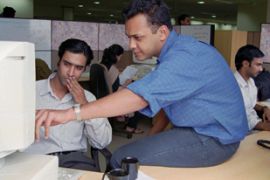Strike shuts India’s technology hub
A general strike over river water cripples life in the Indian city of Bangalore.

Schools and colleges were ordered to shut, shops and businesses closed and taxis, auto-rickshaws, buses and commercial vehicles stayed off the roads as the police patrolled the state to deter trouble, residents said.
“The situation is peaceful,” said Bipin Gopalkrishna, a joint commissioner of Bangalore‘s police. “We have had no reports of any violence from anywhere in the city.”
He said 19,000 policemen were deployed in Bangalore, where streets were deserted as residents stayed indoors or took a long weekend holiday.
A spokesman for Bangalore police chief described the strike as “total”.
The Karnataka Protection Forum, organisers of the protest, threatened to also disrupt flights and trains.
“Some airlines cancelled flights on their own; but operations are 80 per cent normal,” said a spokesman for the Airports Authority of India.
A small number of protesters were caught and handed over to the police when they tried to storm the airport, he said.
A spokesman for the protest organisers said that about 3,000 activists were arrested by the police in Bangalore for trying to block trains.
Many companies in Bangalore, known as India’s Silicon Valley, including leading software makers such as Infosys Technologies, Wipro and Aztechsoft, declared a holiday on Monday and gave their staff an extended weekend while government employees applied for mass leave, the Sunday Times reported.
Electric and water utilities, hospitals, pharmacies and the media have been exempted from the strike.
Emotive issue
Sharing of river water is a highly emotive issue in India, where several regions are prone to droughts that affect the livelihoods of farmers and other rural dwellers who make up two-thirds of India‘s 1.1 billion population.
The waters of the Cauvery, which rises in Karnataka and flows into the Bay of Bengal through Tamil Nadu, have been an age-old source of irrigation.
The river also provides drinking water for the neighbouring states of Kerala and Pondicherry.
The Cauvery tribunal, set up in 1990, has awarded Tamil Nadu more than half of the Cauvery’s water, and Karnataka just over a third, with the rest shared by the two other states.
Riots
A colonial-era law forced the princely state of Mysore – modern Karnataka state – not to use the Cauvery waters without Tamil Nadu’s permission, and the modern dispute began in 1974 when the 1892 agreement lapsed.
The two states have repeatedly resorted to legal action to win a bigger share of the waters, and an interim court order in 1991 that ordered Karnataka to release more water to Tamil Nadu sparked riots against minority Tamils in Bangalore, leaving about 20 people dead.
The Karnataka Protection Forum has promised further protests in the coming days, while HD Deve Gowda, a former prime minister of India and a Karnataka politician, has urged the federal government to step in.
“I am concerned about the plight of our farmers if the award is implemented,” Gowda said in a statement. “Legal analysis alone cannot answer questions related to human happiness or misery.”